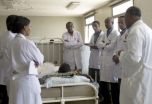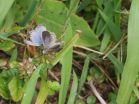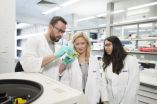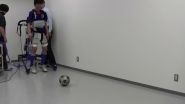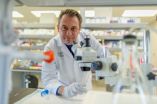(Press-News.org) In a Perspectives paper published in Neural Regeneration Research (Vol. 9, No. 14), Professor Peter Drummond speculates about neuronal changes that might contribute to chronic pain after peripheral nerve injury. Professor Drummond and co-workers at Murdoch University, Perth Western Australia, discovered recently that the expression of α1-adrenoceptors increases on pain-signalling nerve fibers that survive peripheral injury. As these receptors boost neural excitability, an increase in their expression could intensify pain. After tissue injury, resident cells and other cells that migrate to the site of injury release a cocktail of inflammatory mediators and growth factors that help to prevent infection and instigate tissue repair. However, these mediators may also trigger the up-regulation of α1-adrenoceptors on resident cells and nerve fibers that survive the injury. As certain resident and migratory cells are a major source of inflammatory mediators and growth factors, the up-regulation of α1-adrenoceptors may promote a cycle of chronic inflammation and pain. If so, blocking the alpha-1-adrenoceptor might prove to be a useful therapeutic strategy for patients with an adrenergic component of pain after peripheral nerve injury.
INFORMATION:
Article: "Neuronal changes resulting in up-regulation of alpha-1 adrenoceptors after peripheral nerve injury" by Peter D. Drummond (Centre for Research on Chronic Pain and Inflammatory Diseases, Murdoch University, Perth, Western Australia, Australia).
Drummond PD. Neuronal changes resulting in up-regulation of alpha-1 adrenoceptors after peripheral nerve injury. Neural Regen Res. 2014;9(14):1337-1340.
Contact: Meng Zhao
eic@nrren.org
86-138-049-98773
Neural Regeneration Research
http://www.nrronline.org/
Up-regulation of neuronal alpha-1 adrenoceptors after peripheral nerve injury
2014-08-14
ELSE PRESS RELEASES FROM THIS DATE:
New frontiers of fecal microbiota transplantation
2014-08-14
Bethesda, MD (Aug. 14, 2014) – Fecal microbiota transplantation (FMT) is one of the most innovative new treatments of the 21st century. Experts believe that this procedure, which transplants microbes from one human gut to another through fecal matter, could offer the cure to a vast range of diseases and shed new light on the role of the microbiome in gastrointestinal diseases. New research presented this weekend at the American Gastroenterological Association's 2014 James W. Freston Conference in Chicago, IL, highlights significant advances in this field, and confirms the ...
Scientists detail urgent research agenda to address chronic disease toll
2014-08-14
Health care systems that keep HIV patients from dying early in low- and middle-income nations need urgently to be repurposed to treat the chronic diseases that many of these patients now have, experts say.
According to recommendations resulting from a multidisciplinary conference sponsored by the National Institutes of Health, scientists and physicians in low- and middle-income countries should build on existing HIV research to study and treat chronic conditions. Patients once condemned to death by AIDS now suffer from noncommunicable diseases such as tuberculosis, cancer, ...
Study of Chilean quake shows potential for future earthquake
2014-08-14
Near real-time analysis of the April 1 earthquake in Iquique, Chile, showed that the 8.2 event occurred in a gap on the fault unruptured since 1877 and that the April event was not what the scientists had expected, according to an international team of geologists.
"We assumed that the area of the 1877 earthquake would eventually rupture, but all indications are that this 8.2 event was not the 8.8 event we were looking for," said Kevin P. Furlong, professor of geophysics, Penn State. "We looked at it to see if this was the big one."
But according to the researchers, ...
People fake to look authentic on social media
2014-08-14
Presenting an authentic image on social network sites (SNSs) includes an element of fakery according to a new study by researchers at Aalto University. During the study, researchers discovered that being authentic is very important for social media users. At the same time, users also admitted faking parts of their online image in order to conform to social norms and expectations.
By focusing on two SNSs, Facebook and Last.fm, the researchers came to the conclusion that being real is much more acceptable according to social norms.
Although both of these SNSs differ ...
Fukushima's legacy
2014-08-14
Following the 1986 Chernobyl nuclear power plant meltdown, biological samples were obtained only after extensive delays, limiting the information that could be gained about the impacts of that historic disaster. Determined not to repeat the shortcomings of the Chernobyl studies, scientists began gathering biological information only a few months after the disastrous meltdown of the Fukushima Daiichi power plant in Japan in 2011. Results of these studies are now beginning to reveal serious biological effects of the Fukushima radiation on non-human organisms ranging from ...
Immune cell discovery could help to halt cancer spread
2014-08-14
Melbourne researchers have revealed the critical importance of highly specialised immune cells, called natural killer cells, in killing melanoma cells that have spread to the lungs.
These natural killer cells could be harnessed to hunt down and kill cancers that have spread in the body.
The team, from the Walter and Eliza Hall Institute, also found natural killer cells were critical to the body's rejection of donor bone marrow transplants and in the runaway immune response during toxic shock syndrome.
The discoveries came after the team showed that a protein called ...
Newborns' genetic code sends infection distress signal
2014-08-14
Babies suffering from life-threatening bacterial infections such as sepsis could benefit from improved treatment, thanks to a ground-breaking study.
For the first time, researchers have been able to detect and decode a signal generated from a baby's DNA that can tell doctors whether or not a bacterial infection is present in the bloodstream.
The findings could help develop a test for bacterial infection in newborns, using a single drop of blood.
Immediate detection of such infections, which are a major cause of death among young children, is currently impossible ...
Bypass commands from the brain to legs through a computer
2014-08-14
VIDEO:
The right arm muscles and the locomotion center of the man are artificially connected through a computer. His legs are in a relaxed state. When he moves his right hand,...
Click here for more information.
Gait disturbance in individuals with spinal cord injury is attributed to the interruption of neural pathways from brain to the spinal locomotor center, whereas neural circuits locate below and above the lesion maintain most of their functions. An artificial connection ...
Aspirin may slow recurrence in breast cancer patients
2014-08-14
SAN ANTONIO (August 14, 2014) — New findings published today in the journal Cancer Research reveal that some postmenopausal overweight breast cancer patients who use common anti-inflammatory drugs like aspirin or ibuprofen have significantly lower breast cancer recurrence rates.
Researchers from the Cancer Therapy & Research Center at The University of Texas Health Science Center at San Antonio and the University of Texas at Austin began by examining blood serum from CTRC breast cancer patients, said CTRC oncologist Andrew Brenner, M.D., Ph.D.
Studying Blood Serum
They ...
Protein found to block benefits of vitamin A cancer therapy
2014-08-14
Retinoic acid is a form of vitamin A that is used to treat and help prevent the recurrence of a variety of cancers, but for some patients the drug is not effective. The reason for this resistance was unclear until this week when researchers from Virginia Commonwealth University (VCU) Massey Cancer Center demonstrated that a protein known as AEG-1 blocks the effects of retinoic acid in leukemia and liver cancer. Because AEG-1 is overexpressed in nearly every cancer, these findings could impact the care of countless cancer patients.
Details of the study were published ...
